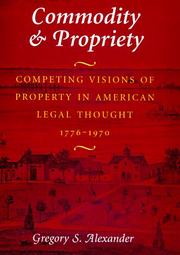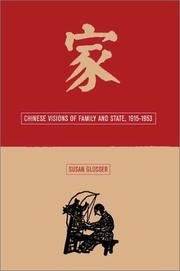| Listing 1 - 4 of 4 |
Sort by
|
Book
ISBN: 1283331845 9786613331847 0520947622 9780520947627 9781283331845 6613331848 9780520266995 0520266994 9780520267008 0520267001 Year: 2011 Publisher: Berkeley, CA : University of California Press,
Abstract | Keywords | Export | Availability | Bookmark
 Loading...
Loading...Choose an application
- Reference Manager
- EndNote
- RefWorks (Direct export to RefWorks)
Ancestral Leaves follows one family through six hundred years of Chinese history and brings to life the epic narrative of the nation, from the fourteenth century through the Cultural Revolution. The lives of the Ye family-"Ye" means "leaf" in Chinese-reveal the human side of the large-scale events that shaped modern China: the vast and destructive rebellions of the nineteenth century, the economic growth and social transformation of the republican era, the Japanese invasion during World War II, and the Cultural Revolution under the Chinese Communists. Joseph W. Esherick draws from rare manuscripts and archival and oral history sources to provide an uncommonly personal and intimate glimpse into Chinese family history, illuminating the changing patterns of everyday life during rebellion, war, and revolution.
Ye family. --- China --- History. --- 14th century. --- 19th century. --- ancestors. --- asian biography. --- biographical. --- china. --- chinese communists. --- chinese history. --- chinese rebellions. --- chinese. --- cultural revolution. --- economic growth. --- everyday life. --- family history. --- family lines. --- historical nonfiction. --- history buffs. --- japanese invasion. --- modern china. --- modern history. --- nonfiction. --- oral histories. --- personal history. --- republican era. --- social history. --- social transformation. --- war and revolution. --- warfare. --- world war ii. --- wwii. --- ye family.

ISBN: 1299104487 0226013529 9780226013527 0226013537 0226013545 9780226013541 9780226013534 0226013537 0226013545 9781299104488 Year: 1997 Publisher: Chicago : University of Chicago Press,
Abstract | Keywords | Export | Availability | Bookmark
 Loading...
Loading...Choose an application
- Reference Manager
- EndNote
- RefWorks (Direct export to RefWorks)
Most people understand property as something that is owned, a means of creating individual wealth. But in Commodity and Propriety, the first full-length history of the meaning of property, Gregory Alexander uncovers in American legal writing a competing vision of property that has existed alongside the traditional conception. Property, Alexander argues, has also been understood as proprietary, a mechanism for creating and maintaining a properly ordered society. This view of property has even operated in periods-such as the second half of the nineteenth century-when market forces seemed to dominate social and legal relationships. In demonstrating how the understanding of property as a private basis for the public good has competed with the better-known market-oriented conception, Alexander radically rewrites the history of property, with significant implications for current political debates and recent Supreme Court decisions.
Property --- Civil society --- Social contract --- Economics --- Possession (Law) --- Things (Law) --- Wealth --- Social aspects --- History. --- Law and legislation --- Social aspects&delete& --- History --- E-books --- United States --- Property - Social aspects - United States - History. --- Civil society - United States - History. --- Primitive property --- property, rights, america, american, united states, usa, history, historical, legal, litigation, law, lawyer, 1700s, 1800s, 1900s, 20th century, scholarly, scholarship, analysis, overview, student, college, university, higher ed, textbook, ownership, proprietary, market, economy, wealth, supreme court, case, judge, jury, civic, definition, thomas jefferson, commercial, republican, era, time period, politics, political, debate.

ISBN: 1282758896 9786612758898 0520926390 1597345350 9780520926394 0585467811 9780585467818 9781282758896 0520227298 9780520227293 9781597345354 Year: 2003 Volume: 5 Publisher: Berkeley : University of California Press,
Abstract | Keywords | Export | Availability | Bookmark
 Loading...
Loading...Choose an application
- Reference Manager
- EndNote
- RefWorks (Direct export to RefWorks)
At the dawn of the twentieth century, China's sovereignty was fragile at best. In the face of international pressure and domestic upheaval, young urban radicals-desperate for reforms that would save their nation-clamored for change, championing Western-inspired family reform and promoting free marriage choice and economic and emotional independence. But what came to be known as the New Culture Movement had the unwitting effect of fostering totalitarianism. In this wide-reaching, engrossing book, Susan Glosser examines how the link between family order and national salvation affected state-building and explores its lasting consequences. Glosser effectively argues that the replacement of the authoritarian, patriarchal, extended family structure with an egalitarian, conjugal family was a way for the nation to preserve crucial elements of its traditional culture. Her comprehensive research shows that in the end, family reform paved the way for the Chinese Communist Party to establish a deeply intrusive state that undermined the legitimacy of individual rights.
Domestic relations --- Family policy --- Families --- Families and state --- State and families --- Public welfare --- Social security --- Social policy --- History. --- Government policy --- China --- History --- S02/0200 --- S11/0493 --- S11/0700 --- S11/0701 --- S11/0710 --- China: General works--Civilization and culture --- China: Social sciences--Society: 1911 - 1949 --- China: Social sciences--Clan and family: general and before 1949 (incl. names, clan rules) --- China: Social sciences--Clan and family in transition: general and before 1949 --- China: Social sciences--Women: general and before 1949 --- Familles --- Politique familiale --- Histoire --- Droit --- Chine --- 20th century. --- china. --- chinese culture. --- chinese history. --- civil rights. --- communist party. --- conjugal family. --- economic independence. --- egalitarian society. --- family order. --- family reform. --- government control. --- human rights. --- individual rights. --- marriage choice. --- modern china. --- national salvation. --- nationalism. --- new culture movement. --- patriarchy. --- reform. --- republican era. --- social change. --- sovereignty. --- state building. --- surveillance. --- totalitarianism. --- urban radicals.
Book
ISBN: 1283379694 9786613379696 140083998X 9781400839988 9781283379694 0691152101 9780691152103 069116195X Year: 2012 Publisher: Princeton : Princeton University Press,
Abstract | Keywords | Export | Availability | Bookmark
 Loading...
Loading...Choose an application
- Reference Manager
- EndNote
- RefWorks (Direct export to RefWorks)
In the early twentieth century, a time of political fragmentation and social upheaval in China, poverty became the focus of an anguished national conversation about the future of the country. Investigating the lives of the urban poor in China during this critical era, Guilty of Indigence examines the solutions implemented by a nation attempting to deal with "society's most fundamental problem." Interweaving analysis of shifting social viewpoints, the evolution of poor relief institutions, and the lived experiences of the urban poor, Janet Chen explores the development of Chinese attitudes toward urban poverty and of policies intended for its alleviation. Chen concentrates on Beijing and Shanghai, two of China's most important cities, and she considers how various interventions carried a lasting influence. The advent of the workhouse, the denigration of the nonworking poor as "social parasites," efforts to police homelessness and vagrancy--all had significant impact on the lives of people struggling to survive. Chen provides a crucially needed historical lens for understanding how beliefs about poverty intersected with shattering historical events, producing new welfare policies and institutions for the benefit of some, but to the detriment of others. Drawing on vast archival material, Guilty of Indigence deepens the historical perspective on poverty in China and reveals critical lessons about a still-pervasive social issue.Some images inside the book are unavailable due to digital copyright restrictions.
Poverty --- Urban poor --- Destitution --- Wealth --- Basic needs --- Begging --- Poor --- Subsistence economy --- City dwellers --- History --- China --- Social conditions --- S11/0550 --- S11/0900 --- China: Social sciences--Social welfare system --- China: Social sciences--Social pathology, social deviance (incl. infanticide, abandoned children, hoodlums) --- Cina --- Kinë --- Cathay --- Chinese National Government --- Chung-kuo kuo min cheng fu --- Republic of China (1912-1949) --- Kuo min cheng fu (China : 1912-1949) --- Chung-hua min kuo (1912-1949) --- Kina (China) --- National Government (1912-1949) --- China (Republic : 1912-1949) --- People's Republic of China --- Chinese People's Republic --- Chung-hua jen min kung ho kuo --- Central People's Government of Communist China --- Chung yang jen min cheng fu --- Chung-hua chung yang jen min kung ho kuo --- Central Government of the People's Republic of China --- Zhonghua Renmin Gongheguo --- Zhong hua ren min gong he guo --- Kitaĭskai︠a︡ Narodnai︠a︡ Respublika --- Činská lidová republika --- RRT --- Republik Rakjat Tiongkok --- KNR --- Kytaĭsʹka Narodna Respublika --- Jumhūriyat al-Ṣīn al-Shaʻbīyah --- RRC --- Kitaĭ --- Kínai Népköztársaság --- Chūka Jinmin Kyōwakoku --- Erets Sin --- Sin --- Sāthāranarat Prachāchon Čhīn --- P.R. China --- PR China --- PRC --- P.R.C. --- Chung-kuo --- Zhongguo --- Zhonghuaminguo (1912-1949) --- Zhong guo --- Chine --- République Populaire de Chine --- República Popular China --- Catay --- VR China --- VRChina --- 中國 --- 中国 --- 中华人民共和国 --- Jhongguó --- Bu̇gu̇de Nayiramdaxu Dundadu Arad Ulus --- Bu̇gu̇de Nayiramdaqu Dumdadu Arad Ulus --- Bu̇gd Naĭramdakh Dundad Ard Uls --- BNKhAU --- БНХАУ --- Khi︠a︡tad --- Kitad --- Dumdadu Ulus --- Dumdad Uls --- Думдад Улс --- Kitajska --- China (Republic : 1949- ) --- Beijing. --- China. --- Communists. --- Japanese penology. --- Nanjing Decade. --- Nationalist Party. --- Nationalist government. --- People's Republic. --- Republican-era China. --- Shanghai. --- World War II. --- agrarian revolutionaries. --- beggars. --- citizenship. --- coffin repositories. --- custodial detention. --- detention. --- government custody. --- government institutions. --- homelessness. --- incarceration. --- industrial training. --- labor. --- nonworking poor. --- poor relief. --- poorhouses. --- poverty policies. --- productive citizens. --- productivism. --- reforming elites. --- refugee crisis. --- refugees. --- relief agencies. --- relief agenda. --- scientific charity. --- security. --- shantytowns. --- social dislocation. --- social parasites. --- socialist ideology. --- sociology. --- straw huts. --- twentieth-century China. --- urban disorder. --- urban poor. --- urban poverty. --- vagrancy. --- war victims. --- work relief. --- workhouse. --- workhouses.
| Listing 1 - 4 of 4 |
Sort by
|

 Search
Search Feedback
Feedback About UniCat
About UniCat  Help
Help News
News